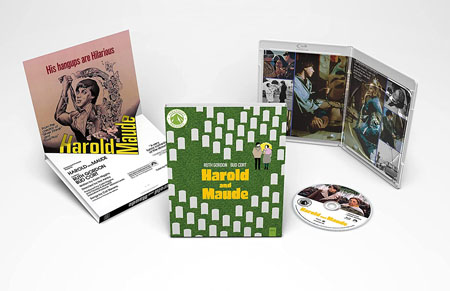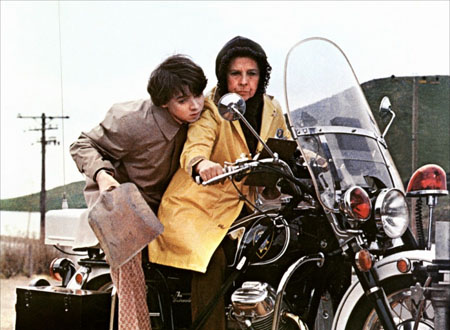
“AGE
IS JUST A NUMBERâ€
By
Raymond Benson
Harold
and Maude,
which was directed by Hal Ashby (his second feature film) and released in 1971,
is one of those initially critically stomped box-office bombs… and yet years
later became a cult hit in revival houses, on television broadcasts, and home
video releases. It’s one of many examples that illustrate how critics don’t
always know everything and how some motion pictures are ahead of their time. Harold
and Maude now resides in the top 50 of the AFI’s list of 100 greatest
comedy films.
Written
by Colin Higgins, who simultaneously turned his original screenplay into a
novel (also published in 1971), the movie was unquestionably a counter-culture,
rebellious black comedy that from the get-go had the potential to offend some
folks. The main character’s fake suicide pranks aside, the theme of a
May-December romance—this time with the woman being the older one in the relationship—was
sure to be off-putting to the moral majority. One often hears the justification
for couples in which one person is much older than the other is that “age is
just a number.†In the case of Harold and Maude, Maude’s number is 79,
while Harold’s is 19. That’s a sixty year difference. Okay, then!
Most
everyone by now knows the story. Harold (Bud Cort) is a cynical young man who
lives with his wealthy, snobbish mother (Vivian Pickles). He is a misfit who is
obsessed with death. He constantly stages gory suicides for shock effect, which
of course upsets his mother as well as any blind dates that she sets up for her
son. Harold also attends funerals for people he doesn’t know, and that’s where
he meets Maude (Ruth Gordon). It turns out that Maude, a concentration camp
survivor, also likes to go to strangers’ funerals, but her outlook on life is
much different than Harold’s. She is wild, happy-go-lucky, and full of life.
She’ll commit misdemeanors like stealing cars for the fun of it. The two develop
a fast friendship, and together they have some misadventures, all set to the
lively music of Cat Stevens. Romance blooms between the two, and Harold
ultimately announces that he will marry Maude. The movie takes a poignant left
turn at this point, and to say more would spoil it for those who have never
seen the picture.
Director
Ashby has always been something of an iconoclast in Hollywood. He started out
as a successful editor who transitioned to directing. He found a niche in the
swinging early 1970s as a helmsman of fringe anti-establishment titles like The
Last Detail (1973) or Shampoo (1975). The failure—and then cult
reputation—of Harold and Maude solidified Ashby’s place as a quirky, but
talented, director. His work here is obviously eccentric, inventive, and
perfect for the material.

Bud
Cort is winning in his role as Harold, but it is of course Ruth Gordon who is
the heart of the movie. Without her screen presence, charisma, and enthusiasm in
the role of Maude, the film would not have worked.
Another
element that elevates the film is the soundtrack full of songs by Cat Stevens.
Most of the tunes were taken from previously-released albums, but two numbers
were composed and recorded specifically for the movie.
Harold
and Maude has
appeared several times in home media, including a now out of print Criterion Collection
edition. A more affordable new release from Paramount Presents is the item on
display here, and the remaster from film transfer looks quite good. It comes
with an entertaining audio commentary by Larry Karaszewski and Cameron Crowe.
The only supplements, though, is a short interview with Yusuf/Cat Stevens and a
couple of theatrical trailers.
For
fans of Hal Ashby, Ruth Gordon, Cat Stevens, and those free-wheeling early cult
films of 1970s Hollywood, Harold and Maude is for you.
CLICK HERE TO ORDER FROM AMAZON